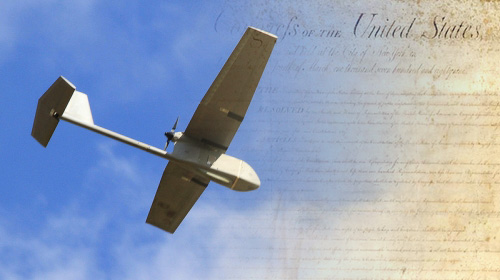
Yes, law enforcement drones are coming, but if , R-Texas, has his way they won’t leave the ground without a judge okaying it first.
Yesterday, Poe introduced the Preserving American Privacy Act to ensure government, particularly law enforcement, use of drones will not violate the Constitution. Before police can launch a drone to search a non-public area, they will have to get a warrant based upon probable cause--the constitutional standard. For public spaces the standard will be reasonable suspicion of criminal activity as well as a reasonable probability that the drone will capture evidence of that criminal activity. Once the order is executed, the police will have 10 days to serve a copy of the warrant to the suspects under surveillance, although the bill allows judges to delay notification if it will jeopardize an ongoing criminal or national security investigation. If government entities violate the public trust and fly drones outside the law, the attorney general can order the Secretary of Transportation to revoke their license.
The ACLU supports the bill and the regulatory framework it’s trying to establish.
To be clear, at the ACLU we understand the incredible promise drones offer to entrepreneurs, farmers, first responders, scientists and professions we can’t even dream of yet. Drones may be deployed to safeguard protesters’ civil liberties. That’s why Poe’s legislation is so important. It creates clear boundaries so that the technology’s positive potential can be explored free of the worry that drones will be used against us in dystopic ways. Powerful technologies need equally powerful constraints, especially when government is the key customer.
“This bill sets clear guidelines, protects individual privacy and informs peace officers so they will know what they can do and what they cannot do under the law,” Poe said. “Nobody should be able to use drones for whatever purpose they want. This bill will make it clear for what purpose law enforcement and citizens and businesses can use drones.”
Over the next decade, an will be spent on drones. That means drones you can’t even imagine will be buzzing and hovering around. They may even deliver you . But as surveillance technologies increase in power and shrink in size, the potential for serious abuse is omnipresent. The possibility of an insect-like drone silently suspended outside someone’s window is no longer sci-fi, it is now just science.
“Just because the government has the technology to look into somebody’s yard doesn’t give it the constitutional right to do so,” Poe said on the House floor yesterday, before introducing his bill. “And that’s just the way it is.”
The law often lags far behind technological innovation. It’s good to see members of Congress sprinting to close the gap.

